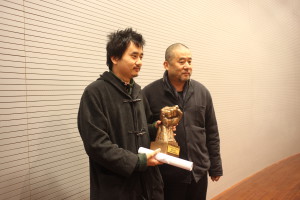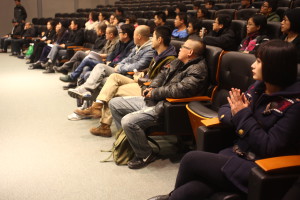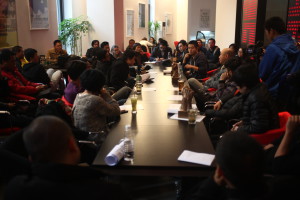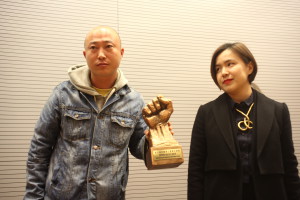James Mudge of the Chinese Visual Festival has kindly shared his Beyond Hollywood report on the 10th China Independent Film Festival, held in Nanjing at the end of 2013. His original report can be found here.
10th China Independent Film Festival
第十届中国独立影像年度展
文:James Mudge
(伦敦华语视像艺术节总监,英国非主流影片网站www.beyondhollywood.com及全球亚洲影片销售网Yes Asia首席影评撰稿人。)
The China Independent Film Festival (CIFF), which recently held its 10th edition, is more than a festival, for two very important reasons. Firstly, the very fact that it was able to operate this year is a triumph in itself, having been shut down by the authorities last year at the last moment. Though it’s not an event which goes out of its way to court controversy or make political statements, many of the films screened have not received official approval from the Film Bureau of the State Administration for Radio, Film and Television (SARFT), and many deal with topics which might not be considered suitable, including crime, bullying and social disorder. Perhaps as a result, despite the festival attracting some very impressive guest directors, in terms of publicity it’s a low-key affair, not widely advertised, even on the campus of Nanjing University of the Arts, where a flagship three day session was held – other events were also held in Dalian and Xiamen. Despite this, it was great to see the screenings in Nanjing being very well attended, most sessions pulling in more than fifty audience members, and many closer to a hundred. As such, the very fact of its continued existence and popularity in the face of such troubles, not to mention the difficulty of funding or finding sponsors for such a festival in China represents effort and passion that’s praiseworthy indeed.
近期结束的第十届中国独立影像年度展(CIFF),超越了简单年度展的意义,其主要原因有两个。首先,该年度展在去年活动预计举行前夕被官方强制关闭,今年该年度展能够如期举行,本身就是一大胜利。虽然活动并不刻意标榜争议,也不作政治宣言,大多展映的影片都是没有获得中国国家广电总局许可的,而且大多影片是关于被认为非恰当题材的内容,包括犯罪、欺侮、和社会不稳定。或许正是因为如此,虽然该年度展邀请到了众多导演参加,但在其公共宣传方面非常低调,没有大规模的广告。即便在本届年度展的展映城市之一南京的主场地,南京艺术学院,关于年度展的宣传也是不太显眼。其他的展映城市还有大连和厦门。尽管如此,还是很高兴地看到南京的影展观众不少,大多场次的观众都超过五十个,很多都近百。因此,该年度展在如此艰难的境况下能够坚持并受欢迎,更不用提为活动在这样的环境中寻求资金和赞助,其体现的组织者对独立电影的努力和激情就是非常值得赞赏的。
Secondly, CIFF offers a fascinating snapshot of the development of independent film making in China. ‘Independent’ is a word with many meanings, especially in a cinematic context, and while the indie scene is undoubtedly growing and maturing in China, it’s running into complications and difficulties. Although Chinese indie films are enjoying an increasingly healthy presence and haul of awards at overseas festivals, these tend to be limited to a certain number of already established directors, who have previously received some manner of official recognition back home. For first time or upcoming directors, and those who have not submitted their films to SARFT, it’s considerably more difficult, as sending their unapproved works to foreign festivals can result in serious repercussions, or even bans. As a result, there’s a challenge to define what truly counts as ‘independent’ in Chinese cinema, and even more of a challenge for directors who try to work outside the system – funding, producing, releasing and screening films off the grid being no mean feat, directors often having to self-finance and commit to great personal sacrifice.
其次,CIFF为中国独立电影的发展提供了一个精彩的窗口。“独立”是一个包含了多重意义的概念,特别是在影片创作中。独立影片在中国无疑在发展和成熟,但也遇到了各种问题和挑战。虽然中国独立影片的观众在健康地成长,在海外也屡屡获奖,但这些影片大多来自同样的一小批导演,而且这些导演大都在中国本土获得了一定的官方认可。对于新进导演,和那些没有获得国家广电总局许可拍摄的电影来说,他们的生存更为艰难。将作品送往国外影展会引起较大的麻烦,甚至禁拍。因此,如何定义何谓真正的“独立”中国电影是具有挑战性的。而对尝试在体制外创作的导演来说则更是挑战,影片的筹资、拍摄、发行和放映都需要付出非一般的努力,大多导演都需要自掏腰包,并做出很大的个人牺牲。
In this context, it was particularly pleasing to see such a variety of different types of films at CIFF this year, with a fascinating selection being screened at the Nanjing event. The festival has an aim of advocating creative freedom, artistic exploration and social responsibility, and it lived up to this by screening films that dealt not only with socially minded topics, but also with love, relationships and the changing of traditions in China. The ‘independent’ banner covered a range of genres and techniques, from comedy to thriller, through to more art house works, and from commercially minded productions to the experimental, several films pushing what audiences might traditionally understand by the notion of film, as opposed to art. With films screened not only from the Mainland, but also from Hong Kong and Taiwan, the festival gave an overall impression of Chinese language speaking societies being in a state of flux, modernity and its shockwaves ringing in the changes both loudly and quietly, expressed by the directors in numerous ways.
在这样的环境中,今年的CIFF能选出一批风格如此丰富的影片令人非常欣慰,在南京展映的精选作品令人目不暇接。年度展的宗旨是提倡创作自由,艺术探索,社会责任感。其放映的影片正是如此,影片的题材不仅是社会问题,也包括爱,情感和正在改变的中国传统。“独立”的旗帜下涵盖了不同的风格和技巧,从喜剧到悬疑,到更艺术风格的作品,从有商业发行前景的作品到更实验手法的,好些影片挑战了观众对传统电影与艺术区分的认识。入选影片除了来自中国大陆的,也有香港和台湾作品。年度展呈现了当今华语世界在流动、现代性以及在剧烈变化中的悸动,基调有些高昂,有些低回,由不同的导演以多样的手法诠释。
Sadly, I wasn’t able to catch all of the screenings, though what follows is a recap of the films and shorts I was fortunate enough to see.
很遗憾,我未能参加所有影片的放映。下面是一些我有幸看到的长短影片回顾。
Features长片
Tomorrow Comes Today
Taiwanese writer director Ming Lang Chen’s “Tomorrow Comes Today” is a cross cultural affair, following a young guy called Dah-Yi from Taiwan, working as a Chinese food delivery man in New York while searching for his mother, brandishing a picture of Marlene Dietrich at everyone he meets. Meanwhile, the film also follows his neighbour Wayne, recently dumped by his girlfriend and trying to forget her by listening to tapes on how to erase memories during his nightly work cleaning phone booths. It’s very much in line with what many would expect from an indie film in the western or US sense, with a meandering plot, lots of symbolism – some clever, some clumsy – and plenty of whimsical touches as its two narrative strands crisscross. Though it doesn’t always work, in general the film is quite charming, and Ming Lang Chen does manage to effectively make some interesting observations on the ways in which the east and west meet, diverge and balance. Through anecdotal details the film depicts connections and near-misses between strangers, their lives often mirroring each other while often remaining out of reach, and this similarly works well as a gentle cultural commentary that doesn’t come packaged with easy answers. Some gorgeous cinematography also helps make the film very watchable, capturing the look and feel of New York through some atmospheric and grounded camera work.
《你的今天和我的明天》
台湾导演陈敏郎的《你的今天和我的明天》是一部跨文化题材的作品。影片跟随了一个来自台湾名叫达一的年轻人。他一边在纽约的中餐馆送外卖,一边寻找母亲,见人就掏出一张三十年代好莱坞著名德国明星玛琳∙黛德丽的照片。影片的另一个主人公是达一的邻居,怀恩。怀恩刚和女朋友分手,在每晚清洗公共电话的工作中听着关于如何抹去记忆的磁带,企图忘记前女友。影片是大多西方或美国审美中所熟悉的独立影片风格,迂回的情节,大量的象征 — 有些很显心思,有些则有点笨拙–,以及两条叙事线各种天马行空的交错。虽然有时影片不够精彩,总体来说还是一部不错的作品。陈敏郎对东西方文化的相遇、差异和平衡作出了一些有意思的观察。通过各种逸事的细节,影片表现了陌生人之间的连接与错失。他们的人生互为镜像,又彼此隔离,这种诠释更多是一种温柔的文化解读,而不给出明确的答案。影片的镜头非常漂亮,以很有氛围感和扎实的摄影抓住了纽约的形与神,因此也令影片的可看度增加。
Fig
“Fig” is the latest offering from Hong Kong indie film maker Vincent Chui, and stands out somewhat from the rest of the CIFF program in that it’s arguably less of an independent production as such, having obviously enjoyed a fairly healthy budget, and boasting a script by Liu Siu Wah, who won the Hong Kong Film Festival Screenplay Award in 2009 for her work on Ann Hui on “The Way We Are”. The story revolves around a Hong Kong housewife called Ka, who leaves her stable though unhappy marriage after tragedy strikes her family, packing her suitcase and heading for Macau, where she takes a job working in a small laundrette. There, she strikes up a friendship with the younger Man, who is going through a crisis in her own life, falling out with her father for his moving on with his younger lover after the death of her mother. The two form an instant bond, which gradually develops into something more, with repercussions for both them and their families.
Though not terribly ambitious, and having a fairly familiar feel, “Fig” is nevertheless entertaining and thoughtful, Vincent Chui and Liu Siu Wah successfully portraying the complexities of modern relationships, families and connections. While some of its symbolism, including laundry as a way of washing away the past and flower pot changing as means of growth, is a little obvious, the film does have a few things to say, which it does in an amiable fashion. It’s a warm and humanistic work, and the viewer gets pulled into the story and the characters’ lives without too much fuss or manipulation as it builds towards an emotionally rewarding conclusion. Strong performances from the two female leads give the material a boost, and some beautiful visuals also help to distract from the film’s shortcomings.
《无花果》
《无花果》是香港独立导演崔允信的新作,和CIFF在南京放映的其它影片相比,是显得不那么独立的一个制作。影片明显有较为充裕的制作预算,编剧为曾凭许鞍华《天水围的日与夜》一片获得2009年香港电影节最佳编剧奖的吕筱华。影片围绕着一位香港家庭主妇,家,展开。在家庭悲剧后,家收拾行李离开了她稳定却不幸福的婚姻。她只身回到澳门,并开始在一间小洗衣房上班。在这里,她邂逅了一位年轻女子敏。敏也正经历着一场家庭危机,她无法面对母亲死后父亲年轻的情人搬进家中,而与父亲决裂。两人很快相交,并逐渐发展出更深的感情,令两人的家庭都被波及。
虽然不是特别有野心,而且感觉过于熟悉,《无花果》仍然是一部兼具娱乐性和思考性的影片。崔允信和吕筱华成功的描画了现代感情、家庭和人际关系的复杂。虽然有些象征有些太浅白,例如洗衣房代表着洗刷过去,换花盆意味着成长,影片确实表达了不少想法,而且表达方式易为人接受。这是一部温情而具人文关怀的影片,观众们在并不刻意的叙事中很快被两位主人公的故事吸引,直到最后达到一个温馨的结局。两位女主角出色的表演为影片增色不少,一些漂亮的画面也遮盖了影片的不足。
Today My Mother will get Married
Mainland film maker and former documentarian Jin Ye makes his feature debut with “Today My Mother will Get Married”, a gritty look at the cruelty enacted by and experienced by adolescents and outsiders. Set in a small, rundown town, the film follows a young boy called Cao Zi, who along with his two friends Jiu Yi and Hou decides to try and stop his mother’s marriage to local rich businessman Zhu Laosan. Trying various ways to get money, including the theft of a French horn and the failed robbery of a taxi driver, the three team with Zhu’s daughter Xia and fake a kidnapping on the day of the wedding in a last ditch attempt to derail things.
“Today My Mother will Get Married” is a fantastic film, and a tough, challenging look at the emergence of a generation of lost adolescents, left largely to their devices while their parents try and earn money, and who have little hope of an economic future themselves. Jin Ye’s experience in documentary film making shines through, as he shoots with a gritty, realistic eye, and the film is never less than utterly convincing, in no small part due to the excellent performances from the young actors. There’s an air of nihilism to the proceedings, the story not only depicting the problems caused and faced by the characters, but also searching for the reasons behind their behaviour. Social concerns balance superbly with narrative tension, and the film works both as commentary and as a drama in the more traditional sense. Though the film has authentic local colour and culture and is very much rooted in modern Chinese issues, there’s a pleasing universality to its cautionary tale, and its subject matter should be recognised by viewers from any country.
《今天我妈要嫁人》
来自中国大陆的资深纪录片导演金也的处女剧情长片作品《今天我妈要嫁人》,以一种粗粝的风格展现了青少年和外来者所经历并又执行的残酷。影片发生在一个没落的小镇,讲述了少年曹子和两个死党九一和侯弟一起试图阻止他妈妈嫁给当地富商朱老三的故事。他们想尽各种办法找钱,包括成功地抢到圆号,和失败地打劫的士司机。三人最后和朱老三的女儿小夏一起上演了一出假绑架事件,以图能阻止婚礼的进行。
《今天我妈要嫁人》是一部精彩的作品,以严酷并具挑战性的目光审视了迷失的一代少年。他们的家长忙于赚钱而疏忽了他们,他们自己却没有多少实在的未来。金也的纪录片拍摄经验令整个影片闪耀起来,影片以粗粝而真实的风格拍摄,因此非常具有说服力,这也得力于小演员们杰出的表演。整个影片的推进有一种虚无主义的氛围,影片不仅表现了主人公们遇到又制造的问题,同时也探求了他们行为背后的原因。现实批判和叙事张力保持了绝佳的平衡,因此影片也达到了传统意义上电影评论与叙事的双重功能。虽然影片带有浓烈的地方色彩且根植于现代中国的问题,其警示意味的故事也有一种令人欣喜的跨文化魅力。故事的主题应该会让任何国家的观众都认同。
Emperor Visits the Hell
In the name of disclosure, I must admit that Li Luo’s “Emperor Visits the Hell” is a little difficult for me to review, given that I’m not hugely familiar with the source material, the classic Chinese story of Emperor Li Shimin, his voyage to the underworld and eventual return to life, which comprises three chapters of “Journey to the West”. However, there’s still a great deal to be impressed by here, the film playing out in modern day China, in bold black and white and with settings that put the story into a new and challenging context. Even without knowledge of the original narrative, the film is a lot of fun to watch and ponder over, with its strong script often being quite deliberately at odds with the contemporary locations, in way which is both relevant and blackly humorous. Li Luo’s direction is taut, giving many scenes a disquieting and tense feel, and combined with the bleak, though attractive visuals, this makes it an intriguing watch, if not a particularly accessible one for the sadly uninitiated.
《唐皇游地府》
首先需要解释,我承认写李络的《唐皇游地府》评论有些困难。我对影片的原材料完全不了解,中国古代皇帝李世民游地府又重回阳间的故事,取材于《西游记》的三个章节。即使如此,该影片仍然给我留下了很深的印象。影片以现代中国为背景,以大胆的黑白片手法将故事建立于一个新鲜又具挑战性的语境。即便对于原本的故事一无所知,该影片仍然是妙趣横生并且令人思考。影片有力的剧本刻意与当下的场景相悖,既有现实意义也充满黑色幽默。李络的导演是紧致的,许多场景都有一种令人不安和紧张的感觉。配上朴拙却吸引眼球的画面,这是一部引人入胜的影片,虽然可能对于不了解中国文化的观众来说有些难懂。
Distant
Yang Zhengfan’s “Distant” is a very different proposition indeed, and though selected as a feature, it’s arguably more of an artistic experiment. Lasting 88 minutes, it’s made up of 13 separate, static long shot, dialogue-free takes, in which the viewer is challenged to interpret what is happening. While some of the shorts are fairly obvious, others are frankly baffling, and as a result, though what Yang has tried to achieve is admirable enough, it’s very slow and difficult watch that would perhaps have served better as an installation. As the title suggests, the film attempts to confront the viewer with a realisation of their distance from the changes happening to the world as a result of modernity, playing around with ideas of time and space, though still, at nearly an hour and a half, it’s an idea which works better in theory than practice.
《远方》
杨正帆的《远方》的确是一部非常另类的作品,虽然入选长片竞赛,但却有更是一个艺术实验片的争议。影片长度为88分钟,由13个镜头组成,镜头之间互不相关,静止拍摄且没有对白,挑战观影者自己去诠释影片中发生的一切。影片的部分镜头比较容易理解,其他的则令人挣扎。因此虽然杨正帆希望达到的目标是令人佩服的,影片非常缓慢且令观者难以坚持,或许作为一个影像装置更合适。如影片的片名所提示的,影片试图令观者直面他们和当下世界发生的事情无法跨越的距离,影片玩味了时间与空间的概念。尽管如此,将近一个半小时的影片,或许太过理想化,实践还是不成功的。
One Pillow One Soul
Zu Songsong’s “One Pillow, One Soul”, is more of a straightforward, typically low key indie feature, which charts the conflict in family brought about by the decision whether or not to move the ancestral tomb after nearby demolition is announced. Set in a rural community, the story sees the family head Changgen trying to convince his brothers to agree, while dealing with a fake feng shui expert and negotiating with a neighbour to allow him to move the graves to his land. The film’s subject matter is interesting, and Zu Songsong uses the premise to explore the ways in which old traditions in rural China are both surviving and adapting to the modern era, superstition and feudal attitudes clashing with the unstoppable tide of so-called progress. At the same time, the troubles which arise within the family and with the other locals presents an unflattering picture of the stubbornness of human nature, most of the characters being driven by self-interest. It’s shot with an authentic and atmospheric feel, Zu showing a great eye for details and achieving a look which is both artistic and almost documentary-like.
Unfortunately, undermining this good work is a very slow pace, and a meandering narrative, which makes it hard going at times, especially during a very drawn out middle section. Many scenes could definitely have done with trimming, there being long stretches of dialogue which, though perhaps realistic, are hard to follow and superfluous, distancing the viewer from what could otherwise have been a more involving tale. This is a real shame, as Zu is clearly a talented director, and with “One Pillow, One Soul” being his debut, he’ll hopefully find more focus in his next outing.
《枕头》
俎松松的《枕头》是一部直接而且典型的低调独立长片,讲述了一个家庭因为拆迁而需要迁祖坟的故事。影片发生在农村,一家之主长根一面劝说他的弟弟们同意,一面和一个伪风水师联系,并和邻居为了能让祖坟迁入他家的地里交涉。影片的取材是有意思的,俎松松用这样的框架探讨了传统在中国农村的生存以及其与现代社会的调和,迷信与封建思想与不可逆转的所谓进步的碰撞。同时,事件引出的家庭内部以及与其他村民之间的矛盾,也显示了人性的固执,片中大部分人物都是主要考虑自身利益。影片镜头拍摄有原创风格,俎松松表现出对细节的捕捉能力,令影片同时具有艺术感和纪录片的真实感。
不幸的是,这样一部好的作品被过慢的节奏和迂回的叙事拖累了,令观者有时难以继续,特别是影片中后部分。很多镜头绝对需要剪短,还有很多大段的对白,可能较为真实,但因冗长而影响观看,令观众们无法接近这样一个本该很吸引人的故事。这是影片的一大遗憾,因为租松松明显是一个有才华的导演。《枕头》是他的处女作,希望他在下一部作品中能更集中剧情。
Shorts短片
The Hammer and Sickle are Sleeping
Set in a small, snowbound rural village, writer director Geng Jun’s “The Hammer and Sickle are Sleeping” is a great example of how to combine social commentary with entertainment. Revolving around three would-be bad guys who try to scratch out a living through various petty crimes, though the story doesn’t really go anywhere, it offers a very effective take on modern morality. The three are likeable despite their obvious flaws and weaknesses, and though their incompetence makes for some great comedy, the film also has a humanistic and vaguely depressing air, its banal savagery being driven by desperation rather than any deep rooted evil. Geng Jun directs with real artistry, making great use of the local scenery, and the fifty two minute film is accomplished and well-made.
《锤子镰刀都休息》
拍摄于一个大雪覆盖的小村庄,编剧导演耿军的《锤子镰刀都休息》是一部融合社会批判与娱乐观赏的典范。影片围绕着三个将要做坏人的汉子,以各种小打小闹的犯罪手段维持生计。虽然并没有明显的走向,影片有力的展现了现代道德的故事。三个人物尽管有各种缺陷和弱点,还是讨观众喜爱。一方面他们的无能造出令人不禁的喜剧,另一方面片子也充满人文关怀和若有若无的压抑,这种低级犯罪更多地源于无望,而不是深根的邪恶。耿军的导演是真正的艺术,对当地景致的充分利用,令这部52分钟的影片成为一部难得的佳作。
Butter Lamp
Even without any English subtitles, Hu Wei’s “Butter Lamp” is still an intelligent and fun short. Set in Tibet, it comprises a static camera shot in which various locals and nomads pose for a photographer in front of a variety of painted backgrounds of famous and iconic locations and landscapes. Amusing and very effective, this device allows Hu to create a playful sense of place and to comment on changing traditions. The reactions of the subjects are fascinating to watch, and thankfully the film never comes across as manipulative or exploitative, but rather as an honest and thoughtful effort, and as a very original and creative means of getting his message across.
《酥油灯》
即使没有英文字幕,胡伟的《酥油灯》仍然看得出来是一部充满了智慧和欢乐的短片。拍摄于西藏,影片由一个固定摄像机完成。各种各样的村民和牧民在一张张巨幅的风景画面前照相,这些风景有各种著名国际和当地名胜。富有幽默感而且非常有力,这个方式让胡伟创造出一个玩味意义的空间来解读改变的传统。照相的人们的反应极为有趣,而且很幸运地影片从未有操纵或利用的感觉。相反,这部作品真诚而构思巧妙,以非常有原创性的方式表达了作者的观点。
Downstream
Hong Kong director Zune Kwok’s short “Downstream” was arguably one of the most entertaining of the festival, focusing on a young half-Indian local called Peter Chen working as a delivery driver. After running into another vehicle, he finds himself needing to come up with compensation money fast, and rushes around trying various schemes to raise the funds, resulting in a never ending stream of troubles. Effective and enjoyable both as a piece of social commentary and a comedy of errors, it’s fast moving and tightly directed, Peter making for a likeable protagonist who it’s easy to route for. Dealing with discrimination and life at the lower end of the economic scale, it’s an authentic and intelligent piece, that feels fresh and impresses throughout its 24 minute running time – Zune Kwok is clearly a director to look out for in the future.
《流放地》
香港导演郭臻的短片《流放地》或许是整个年度展中最具娱乐性的作品了。影片讲述了一个印裔青年陈彼得在香港的故事。陈彼得是一个货运司机,他撞上了一部车后需要很快筹集赔款。于是便通过各种方式来凑出这一笔钱,而导致了一连串似乎无休止的状况。影片紧凑而且观赏性强,既是一篇社会批判作品,又是一部错误喜剧,影片的节奏很快而且导演得富有张力,彼得是一个很容易获得观众好感的主角。影片关注了歧视和社会底层的生存,真实而巧妙,整个24分钟都感觉十分清新和亮眼。郭臻绝对是一位值得关注的导演。
Translation: Jingjing Xie 译:谢晶晶




